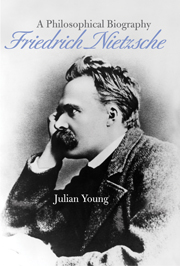Book contents
- Frontmatter
- Contents
- List of Illustrations
- Acknowledgments
- List of Abbreviations
- PART ONE Youth
- Chapter 1 Da Capo
- Chapter 2 Pforta
- Chapter 3 Bonn
- Chapter 4 Leipzig
- Chapter 5 Schopenhauer
- PART TWO The Reluctant Professor
- PART THREE The Nomad
- Chronology
- Notes
- Bibliography of Secondary Literature
- Index
- Plate section
Chapter 1 - Da Capo
from PART ONE - Youth
Published online by Cambridge University Press: 07 September 2011
- Frontmatter
- Contents
- List of Illustrations
- Acknowledgments
- List of Abbreviations
- PART ONE Youth
- Chapter 1 Da Capo
- Chapter 2 Pforta
- Chapter 3 Bonn
- Chapter 4 Leipzig
- Chapter 5 Schopenhauer
- PART TWO The Reluctant Professor
- PART THREE The Nomad
- Chronology
- Notes
- Bibliography of Secondary Literature
- Index
- Plate section
Summary
Röcken
Nietzsche's greatest inspiration, he believed, was the idea that if one is in a state of perfect mental health one should be able to survey one's entire life and then, rising ecstatically to one's feet, shout ‘Da capo! – Once more! Once more! Back to the beginning!’ – to ‘the whole play and performance’. In perfect health one would ‘crave nothing more fervently’ than the ‘eternal return’ of one's life throughout infinite time – not an expurgated version with the bad bits left out, but exactly the same life, down to the very last detail, however painful or shameful. His own particular task was to become able to do this, to reach a point where he could shout ‘Da capo!’ to his own life. Let us see what he had to contend with before reaching that point.
Friedrich Nietzsche, ‘Fritz’, was born (exactly a week before one of his divinities, Sarah Bernhardt) on October 15, 1844, in the Saxon village of Röcken. Two facts about this birthplace are important.
The first is that Röcken lay in that part of Saxony which had been annexed in 1815 by the rising power of Prussia. This was a punishment for the Saxon king's alliance with Napoleon, whom the Prussians, together with their allies, the Russians, Austrians, and Swedes, had defeated in the battle of Leipzig in 1813.
- Type
- Chapter
- Information
- Friedrich NietzscheA Philosophical Biography, pp. 3 - 20Publisher: Cambridge University PressPrint publication year: 2010



